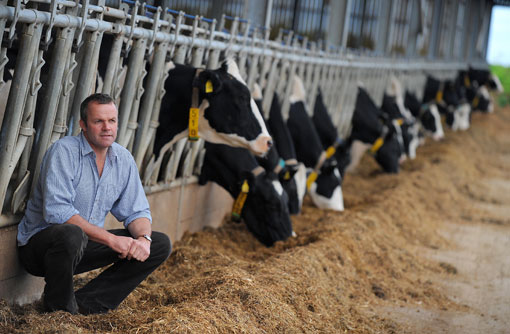FW Awards 2011: Dairy farmer of the year finalist – Peter Willes

Peter Willes
Parkham Farms, Devon
If there’s one system that proves high cow numbers and yields doesn’t mean poor cow health and welfare, then Peter Willes’ farm is it.
From humble beginnings of 100 cows in 1984, the Parkham Farms business now farms 2,100 cows across three units, producing an average 10,700 litres a cow a year. Some 45m litres of milk are also bought in from 28 local farms and processed in the on-farm cheese unit, with cheese sold through several supermarkets, including Tesco and the Co-op.
The farm has put a lot of work into adapting and building the business so it is fit to deal with the challenges that face all UK dairy producers, and cow health and costs have been central to all improvements. Peter is also a big supporter of progressive farming, having put in the planning application for 8,100-cow Nocton Dairies last year.
The key to success is constantly thinking how to improve, says Peter. “We don’t tend to look at milk price, but instead look at how we can control costs. Every pound we spend is tracked and we carry out monthly financial recordings.”
Such careful monitoring has resulted in a reduction in cost of production of more than 3.5p/litre leading to profits of about 5p/litre.
Peter also believes KPIs are a reflection of financial performance in the following 12 months. “They may not be actual financial figures, but they are all linked – herd health drives profits,” he says.
And to maximise cow health, existing buildings have been modified to improve ventilation, helping to improve cow comfort and reduce heat stress. A new 400-cow building has also been built, with open sides and purpose-built sand beds for dry cows. Sand cubicles have been installed across the board to maximise cow comfort.
Economies of scale mean staff are able to specialise in certain areas. For example, four people are dedicated to calving cows 24 hours a day, and one person is in charge of feeding.
“We have a high labour to cow ratio with one person to every 60 cows, as opposed to more than 100 cows three years ago, but we still have a low pence-a-litre cost.”
All forages are home-grown to reduce costs and lactose from the cheese making is fed back to the cows as a replacement for cereals. Consequently, all forages have to be dry, with the aim to produce grass silage at 40% DM with five cuts taken a year.
Extra fibre in the ration has also improved cow health, with cows eating more, but ration costs reduced.
All these changes have resulted in a boost to cow health. Lameness incidence stands at less than 10% of cows, conception rates to all services at 35% and calving interval at 393 days – at the same time yields have increased from 9,000 litres to 10,700 litres since 2008.
Peter recognises that the farm has fallen short in certain areas of environmental management, however, he is making big strides to implement best practice. “While our efforts to expand and create an economically-sustainable business have greatly improved animal welfare, they have resulted in some shortfalls in environmental management.” The farm was fined earlier in the year for shortfalls in waste management and effluent run-off in 2010.
Consequently, an environmental manager has been employed to monitor performance, and waste management has been one of the key areas addressed. All three farms have also submitted applications for ELS and have joined LEAF.
The cheese-making business has made more environmental progress. When milk is processed into cheese, the whey and whey protein is extracted, processed and sold for the ingredients market and the lactose fed back to the cows. Heat recycling technology has also cut fossil fuel consumption by 35%.
Peter’s well-publicised application for Nocton Dairies placed him in the spotlight and means he has spoken at many industry events. He also strongly recognises the importance of informing the public about dairy farming.
The judges liked
Outstanding technical and business performance
Good cow health coupled with high yields
Focused on cost control
Farm Facts
2,100 cows across three units
10,700 litres a cow a year at 4% fat and 3.5% protein
Milking three times a day
On-farm cheese processing unit producing 4,500t a year
